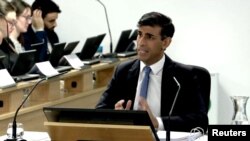Prime Minister Rishi Sunak defended Britain's handling of the COVID-19 pandemic on Monday, telling an official inquiry he did not recognize testimony describing a dysfunctional government and saying his hospitality scheme was supported at the time.
The inquiry is examining Britain's response to the pandemic which killed more than 230,000 people in the country. It has heard that the government of then-prime minister Boris Johnson was gripped by infighting and incompetence, and unable to make a decision.
Sunak was a relatively unknown politician when he was promoted to finance minister on the eve of the pandemic, appearing to be sure-footed as he set out hundreds of billions of pounds of support to keep companies and livelihoods afloat.
He has come under fire during the inquiry from other witnesses over his "Eat out to help out" subsidized meal scheme, which encouraged people to visit restaurants and pubs in August 2020.
Some scientists have questioned whether Sunak's policy may have contributed to a wave of infections, but Sunak said scientists and other ministers did not raise any objections during meetings in the month leading up to the scheme.
He said that "Eat out to help out" took place within guidelines for the safe reopening of hospitality which had happened in July and that was why the policy went ahead.
"My primary concern was protecting millions of jobs of particularly vulnerable people who worked in this industry (hospitality)," Sunak told the inquiry.
The inquiry has also heard testimony from scientists and officials who questioned whether Sunak prioritized the economy over public health, as economic output contracted by 10% in 2020.
He told the inquiry on Monday that he wanted to say how "deeply sorry" he was to those who had lost loved ones, and that he was there in the spirit of wanting to learn how the government could do better in any future pandemic.
But he echoed Johnson in saying the fact that "debates raged" was not necessarily a bad thing.
"It's right that there was vigorous debate because these were incredibly consequential decisions for tens of millions of people in all spheres, whether it was health, whether it's education, whether it was economic, whether it was social, whether it was a long-term impact.
"These were incredibly big decisions, the likes of which no prime minister has taken in decades, if ever," he said.
Sunak became prime minister in October 2022 after Johnson and his successor Liz Truss were forced out of office.





